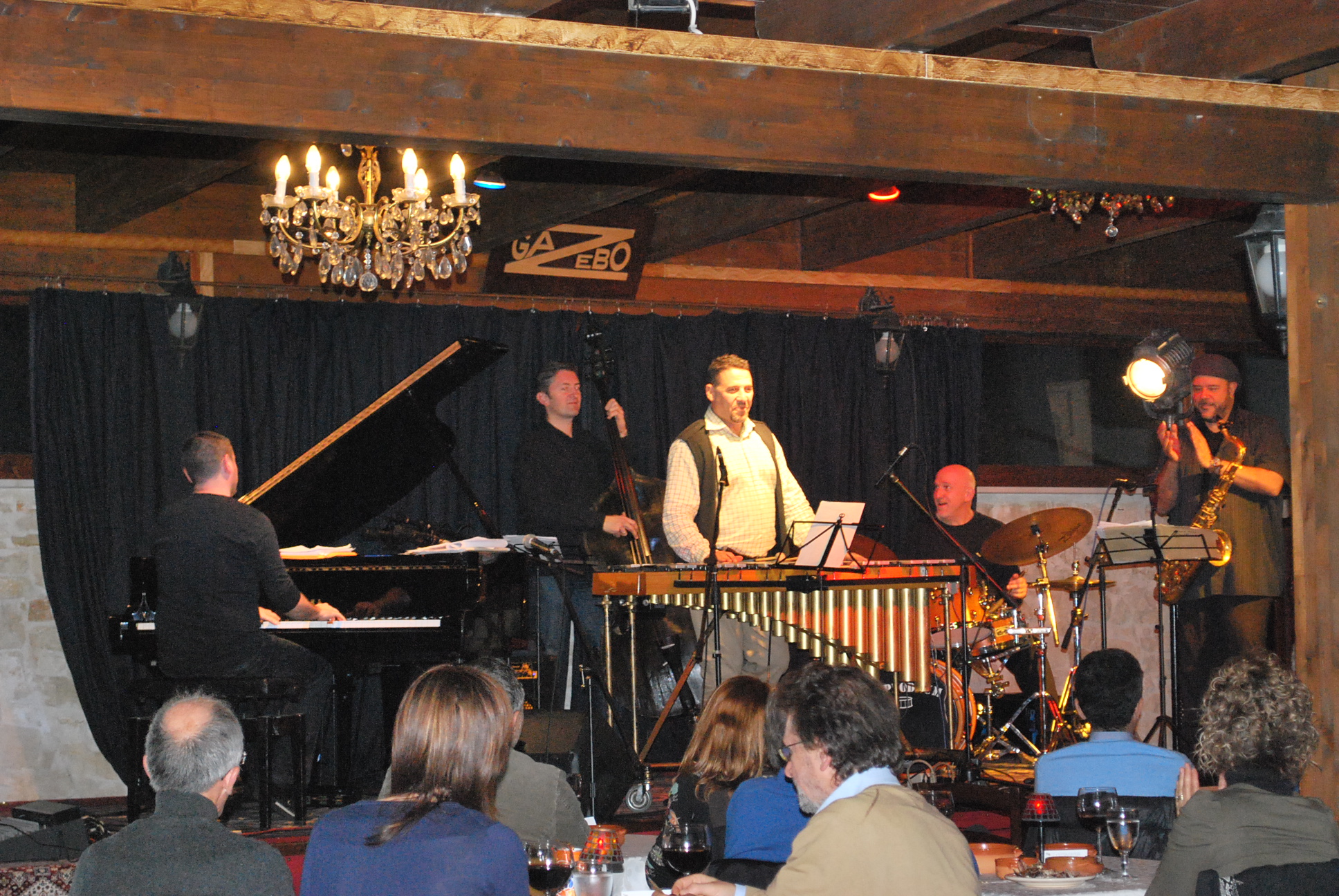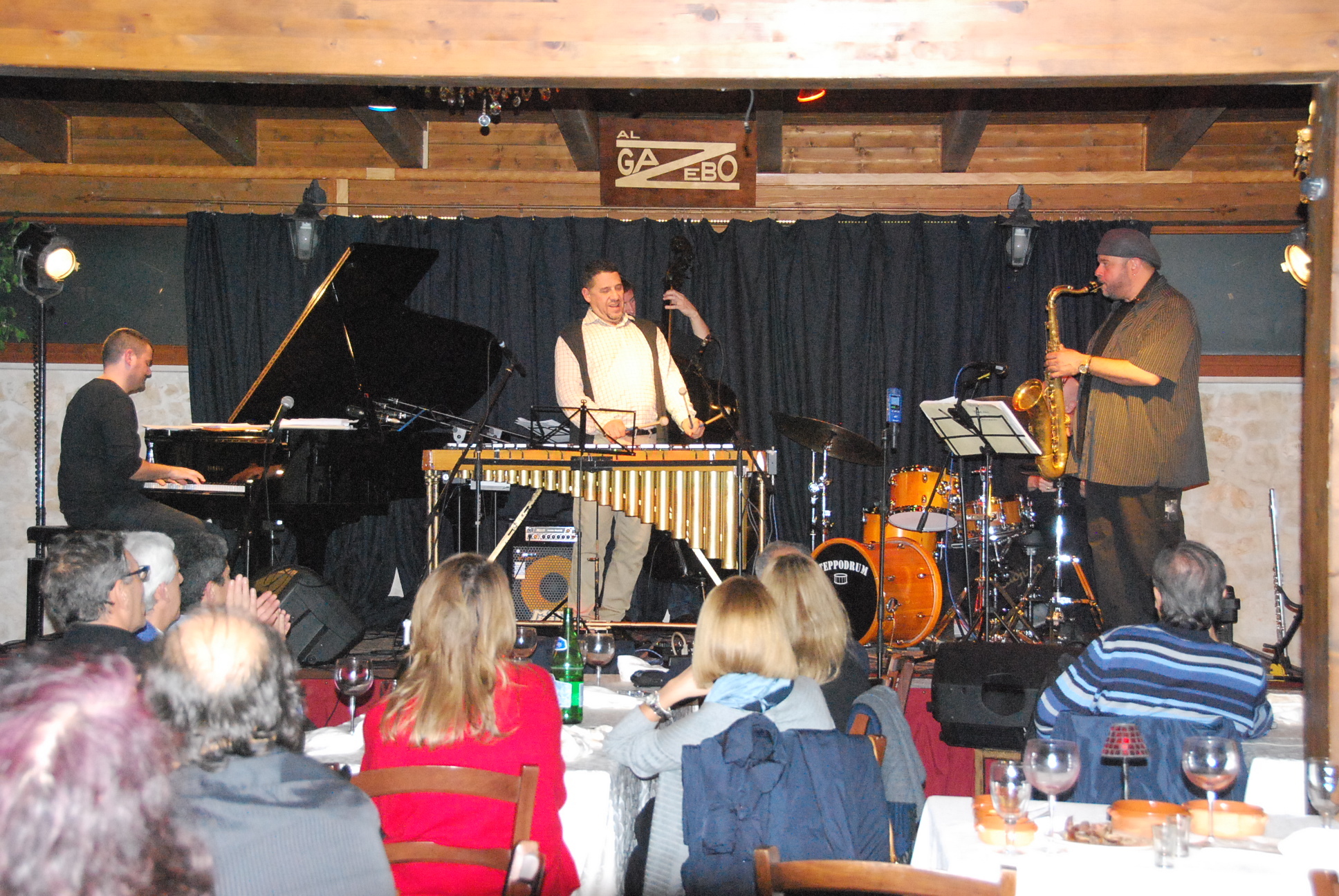Exclusive by “L’Idea” magazine: interview with Mark Sherman – One of the most talented vibraphonist in the world. His exhibition, Sunday, November 18, 2012, at the Gianni Brunetti’s Bed and Breakfast “Dal Canonico”, in the countryside of Brenca/San Materno, Mola di Bari (Italy)
Sunday night, November 18, 2012, a big musical event in Mola di Bari, at the Bed and Breakfast “Dal Canonico”, located in the countryside of Brenca/San Materno. We were among those few lucky people that enjoyed the exhibition of Mark Sherman, one of the most talented vibraphonist at international level. Two hours of jazz concert that the audience followed with emotion attached to their seats, wishing it would never end.
Sherman sang along with a talented and formidable group, named “Th3m project”, two Americans and two Europeans, each one of them absolutely great. We’re talking about Paolo Di Sabatino, at the piano; Bob Franceschini sax; Martin Gjakonovsky at double-bass and Adam Nussbaum, percussions. In other words the best the jazz field can offer nowadays.
At the end of the concert we asked few question to Mark Sherman, who we found very amiable and humble.
L’Idea: How do you like Mola and this place?
Sherman: Very beautiful place. We took a long walk around the vineyard today. This place is incredible, with all these woods. Of course the food is out of this world. And Italy. It’s a very beautiful place.
L’Idea: Recently you’ve been selected as a cultural jazz ambassador by the US State Department. How do you feel about that?
Sherman: To actually to go on tour representing the United States was a true honor. I did 30 concerts and a bunch of workshops. I made thirty concerts in Asia. One week in Russia, one week in South Korea, about 12 days in China, and another week in the Philippines. It was very enlightening; it was like almost like a music Olympics. I felt it as if it was a gold medal. Just incredible. Any time you can go tour and play so many concerts with the same group in a row, is truly a magical experience and makes the music grow; music itself grows and then you grow as a player. It was a very intense tour, but we were treated as kings; all embassies took care of us. Very intense tour; a true honor.
L’Idea: You’ve been in tour during this year 2012 in Italy. What do you think about this Country and the Italians?
Sherman: I love the Italian people. I love their cuisine, their customs, their architecture. I have a lot of good friends who are Italians. My wife is Italian. I have to say, Italian people are full of drama and “passione”; molto drammatico and molta passione.. The women are beautiful. I have been here four times; each time, they treated me as a king. I love it. I am very satisfied..
L’Idea: I understand you’re currently on the faculty of the Juilliard School and New York Jazz Workshop. What about this experience with youngsters? I guess they want to grab something from you because you’re a talented person, aren’t they?
Sherman: Yes they try, they want to grab something from me. Of the three Schools were I teach at, the number one is the Juilliard School, a conservatory. I went to school there for five years and my mother went to school there, as an opera singer. Now I have the privilege of being a professor there. The talent level at this school is behind believe, really; you have incredible, young talents who are just ready to go out and be professionals right now. It’s definitely another privilege for me to teach at that School and be part of this faculty that they have loaded full of jazz masters. It’s really a fantastic place.
L’Idea: When I was young, like twenty, twenty five years old, I loved a musician called Lionel Hampton. What do you think about him, the way he used to sing songs and his repertory?
Sherman: There was a guy before him that began the foundation for that instrument of vibraphone, and that was Red Norbell. Lionel Hampton sort of carried on what he did. In some other way Lester Young was one of the first guys and so was Ben Webster. Charlie Parker sort of carried on the tradition into another era; so Red Norbell was one the premiere vibraphonists many years ago, in the swing style, followed by came Benny Goodman and others. Then Lionel Hampton came along and he took it to the next level, harmonically. After him, the true master of the instrument was Milt Jackson. He became the true “bebop” master; he’s like the Charly Parker of the vibraphone, he was a truly unique individual. He had a perfect pitch; he could play in any tune and in any key and he had the total command of the poetic language of jazz. He took to the next level, and then, of course, you have young players like Bobby Hutchinson, myself and Joe Luck, Steve Nelson, and Manerios, another guy who carried the torch for many years. Is a very sort of a misunderstood instrument. Lionel Hampton and Milt Jackson laid the foundation for this instrument. So, I’m very much in debt to them for that. We try to keep the tradition alive, in our own way.
L’Idea: Do you know our kind of popular /folk music, “Pizzica” and “Taranta”?
Sherman: I’ve heard of it. I wish it was part of my musical language, but it’s totally out of my culture. It never really became part of my language.
L’Idea: Do you think that it can be a sort of contamination with the jazz?
Sherman: Oh no. I think that there is good music and bad music. I’m sure there is some great people who play an incredible Tarantella, and probably some pretty croppy ones too. And in jazz is the same way. You have musicians who are masters of the poetic language of jazz. And then you have musicians who are not; who are trying to be, but they’re not. I like all music: I like rock, I like hip hop, I like blues; off course I’m running in the jazz tradition, that’s what I work on; I practice, that’s why I live by. Basically my life is surrounded by that tradition. I had a lot of classical training. Classical music falls into play.
L’Idea: Do you think Taranta is a good music.
Sherman: Sure. Why not. If it’s done well. You can be doing Polkas or Broadway shows, anything, if you do it well. If you do it well, is going to sound really good. I favor jazz, because that’s is what I live for. But I don’t like to favor music to pick one music against another, meaning that one is better than another, because that’s not true.
L’Idea: When you make your songs, when you play, how much of your performance is inspiration? While you sing, are you inspired?
Sherman: Oh yes. I’m inspired by the elements that surround me, the situations around me: my wife, my children, my friends, my mother. I am always inspired by those elements. Mostly, though, I’m inspired by the poetic language of jazz, the mastery of the language, the quest to get better at it. For me that’s the true motivation. I’m happiest when I’m dealing with that language, speaking the poetic language of jazz, like speaking English. I’m happiest when I’m on the stage playing. So, for me, that’s it. That’s my life; my life is fulfilled by playing music. When I write songs I try to incorporate a lot of the elements that I know; it could be classical music or jazz elements, like traditional jazz, post pop jazz, even rhythmic, since I was a drummer for many years.
L’Idea: So, we can say you live for jazz?
Sherman: I live for music, but it happens that my biggest commitment is to the poetic language of jazz and the development of that, the improvement of my own skills, saying something in that environment.
L’Idea: Thank you very much, Mark, for the wonderful evening and best wishes for your career from all our readers.








